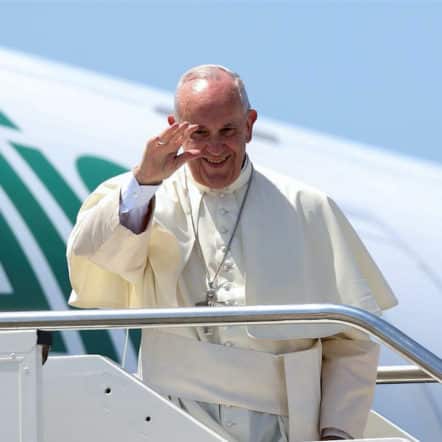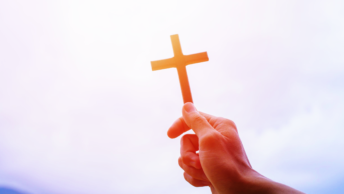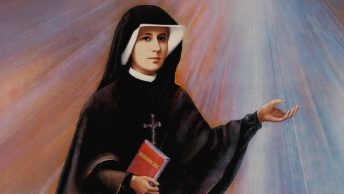The Second Sunday of Easter is the Sunday in which the universal Church, according to the personal will of Christ himself, celebrates the feast of the Divine Mercy. In entry 229 of her Diary, St. Faustina faithfully records Jesus’ words as given by Him to her and to the whole world: I desire that the First Sunday after Easter be the Feast of Mercy.
In front of the explicit wish of Christ the Head, the Church, as His mystical Body, simply has no choice other than fulfilling his divine wish. In fact, it was St. John Paul II, the Great Mercy Pope, who, as the Vicar of Christ and the Successor of St. Peter, officially established the Divine Mercy Sunday as a feast day for the entire Church. He did this when he canonized his fellow countrywoman, Blessed Faustina Kowalska, on Sunday 30 April 2000, at St. Peter’s Square. Truly powerful are the words that Pope Wojtyla addressed to the immense crowd which was present for the canonization both in Rome as well as worldwide through the means of communication available at the time:
“It is important then that we accept the whole message that comes to us from the word of God on this Second Sunday of Easter, which from now on throughout the Church will be called ‘Divine Mercy Sunday’. In the various readings, the liturgy seems to indicate the path of mercy which, while re-establishing the relationship of each person with God, also creates new relations of fraternal solidarity among human beings. Christ has taught us that ‘man not only receives and experiences the mercy of God, but is also called ‘to practise mercy’ towards others: ‘Blessed are the merciful, for they shall obtain mercy’ (Mt 5: 7)’ (Dives in misericordia, n. 14). He also showed us the many paths of mercy, which not only forgives sins but reaches out to all human needs. Jesus bent over every kind of human poverty, material and spiritual. His message of mercy continues to reach us through his hands held out to suffering man. This is how Sr Faustina saw him and proclaimed him to people on all the continents when, hidden in her convent at Łagiewniki in Kraków, she made her life a hymn to mercy: Misericordias Domini in aeternum cantabo. (no.4).”
In no time have such words become so prophetic as the present, in which we are living, dominated as it is by the Covid-19 pandemic. In front of so much suffering, angst, fear and uncertainity the mighty words of Our Saviour reverberate, once more, the whole universe: Mankind will not have peace until it turns with trust to My mercy (Diary, 300). But what kind of mercy did Jesus demand from St. Faustina, and, by implication, is asking today from you and me who are shouldering the consequences of this disturbing day and age? Jesus gives his unshakeable reply in entry 742 of St. Faustina’s Diary.
I demand from you deeds of mercy, which are to arise out of love for Me. You are to show mercy to your neighbours always and everywhere. You must not shrink from this or try to excuse or absolve yourself from it. I am giving you three ways of excersing mercy toward your neighbour: the first – by deed, the second – by word, the third – by prayer. In these three degrees is contained the fullness of mercy, and it is an unquestionable proof of love for me. By this means a soul glorifies and pays reverence to My mercy.
Another great proclaimer of God’s Mercy, Pope Francis, magnificently showed us how these divine words of Jesus, which offer the most robust life programme ever presented under the sun, can be easily applied to the current coronavirus saga we are witnessing first-hand. In his address before the Urbi et Orbi blessing, given on Friday 27 March 2020, in a vast empty St. Peter’s Square, Pope Francis made crystal clear the point that prayer and fraternal servicego together and never, as some would like to stress, that they are at odds with each other!
“This is the force of the Spirit poured out and fashioned in courageous and generous self-denial. It is the life in the Spirit that can redeem, value and demonstrate how our lives are woven together and sustained by ordinary people – often forgotten people – who do not appear in newspaper and magazine headlines nor on the grand catwalks of the latest show, but who without any doubt are in these very days writing the decisive events of our time: doctors, nurses, supermarket employees, cleaners, caregivers, providers of transport, law and order forces, volunteers, priests, religious men and women and so very many others who have understood that no one reaches salvation by themselves. In the face of so much suffering, where the authentic development of our peoples is assessed, we experience the priestly prayer of Jesus: ‘That they may all be one’ (Jn 17:21). How many people every day are exercising patience and offering hope, taking care to sow not panic but a shared responsibility. How many fathers, mothers, grandparents and teachers are showing our children, in small everyday gestures, how to face up to and navigate a crisis by adjusting their routines, lifting their gaze and fostering prayer. How many are praying, offering and interceding for the good of all. Prayer and quiet service: these are our victorious weapons.”
In other words, when the three degrees of mercy, by deed, word and prayer, are fully completed, then we can say that we truly love Jesus because we are, effectively, loving others. Thanks to Jesus’ Merciful Spirit, we start treating each other in the image and likeness of God (Gn 1:26). This is so since His Spirit unravels to us, personally, that the person we are encountering is himself and herself redeemed with the precious blood of Christ (1 Pt 1:18). It is thanks to this precious blood that we have all been saved. It is this blood, which we offer to the Father, for the world’s salvation, that really redeems us.
At the 3 O’Clock prayer we pray daily: You expired, O Jesus, but the source of life gushed forth for souls and an ocean of mercy opened up for the whole world. O Fount of Life, unfathomable Divine Mercy, envelop the whole world and empty Yourself out upon us. O Blood and Water, which gushed forth from the Heart of Jesus as a fount of mercy for us, I trust in You. Amen (Diary, 1319). Commenting on this special hour Jesus said: In this hour you can obtain everything for yourself and for others simply by asking; it was the hour of grace for the whole world – mercy triumphed over justice (Diary, 1572). Let us, at 3 O’Clock, with this extraordinary prayer, pray not only for the healing and protection from Covid-19 but, and mainly, that we let the Holy Spirit mould in us a heart of flesh which shows mercy towards each other, to the migrants who are left stranded on the Mediterranean Sea and to ourselves too.
Above all, this mercy reaches its zenith when we pray for the conversion of sinners with that efficacious prayer called the Divine Mercy Chaplet. A prayer which, thanks to the Decree of the Apostolic Penitentiary on the granting of special Indulgences to the faithful in the current world pandemic, published on 20 March 2020, a plenary indulgence is granted when this Chaplet is recited. What a great prayer the Divine Mercy Chaplet is “to implore from Almighty God the end of the epidemic, relief for those who are afflicted and eternal salvation for those whom the Lord has called to Himself!”








